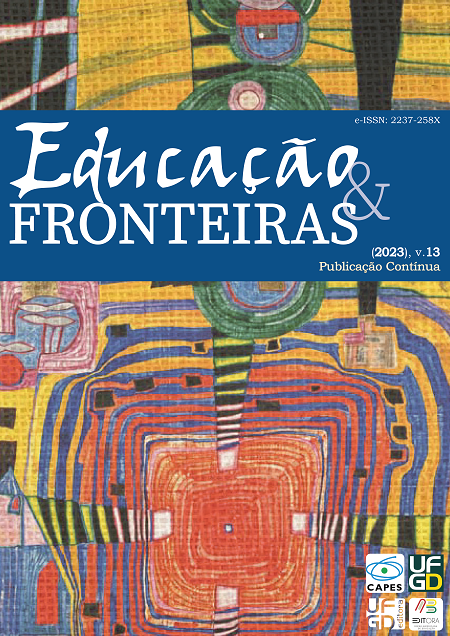Environmental Education and Nature's Rights
Emergencies and possible dialogues
DOI:
https://doi.org/10.30612/eduf.v13i00.16348Keywords:
Critical Environmental Education, Ecopolitics, Nature's RightsAbstract
This article is located in the field of ecopolitics approaches, in the Latin American context, of critique of Education and Environmental Law, and proposes an approximation of Education with the Rights of Nature, whose base lies in the recognition of nature as a subject of rights and societies of good living. The study is characterized as a hypothetical-deductive theoretical essay with a literature review and data analysis through legal norms. Its main objective is to investigate whether recognizing the Rights of Nature can contribute to constructing theoretical and practical proposals for Critical Environmental Education.
Downloads
References
ACOSTA, A. O bem viver: uma oportunidade para imaginar outros mundos. São Paulo: Autonomia Literária, Elefante, 2016. DOI: https://doi.org/10.7476/9788578794880.0006
ALBUQUERQUE, A. R. O ‘ponto de não retorno’ da Floresta Amazônica. Monitor Mercantil, 2021. Disponível em: https://monitormercantil.com.br/o-ponto-de-nao-retorno-da-floresta-amazonica/. Acesso em: 30 jul. 2021.
ALIMONDA, H. En clave de sur: la Ecología Política Latinoamericana y el pensamiento crítico. In: ALIMONDA, H. et al. (coord.). Ecología política latinoamericana: pensamiento crítico, diferencia latinoamericana y rearticulación epistémica. Buenos Aires: CLACSO; México: Universidad Autónoma Metropolitana; Buenos Aires: Ciccus, 2017.
CORTEZ, D. Genealogía del “buen vivir“en la nueva Constitución Ecuatoriana. In: INTERNATIONAL CONGRESS FOR INTERCULTURAL PHILOSOPHY, 8., 2009, Seoul. Proceedings […]. Good life as humanized life. Conceptos of good life in different cultures and their meanings for politics and societies today. Seoul: Ewha Womans University, 2009.
FOLADORI, G. Educación ambiental en el capitalismo. Revista Pesquisa em Educação Ambiental, v. 13, n. 1, p. 48-57, 2018. DOI: https://doi.org/10.18675/2177-580X.vol13.n1.p48-57
FREIRE, P.; FAUNDEZ, A. Por uma pedagogia da pergunta. Rio de Janeiro: Paz e Terra, 1985.
GIFFONI, J. F. et al. Paradigma dos direitos da natureza. In: LACERDA, L. F. (org.). Direitos da natureza: marcos para a construção de uma teoria geral. São Leopoldo, RS: Casa Leiria, 2020. DOI: https://doi.org/10.29327/524851.1-1
GUIMARÃES, M. Educação Ambiental Crítica. In: LAYRARGUES, P. P. (coord.). Identidades da educação ambiental brasileira. Brasília, DF: Ministério do Meio Ambiente, 2004.
KRENAK, A. Caminhos para a cultura do bem viver. Rio de Janeiro: Escola Parque, 2020.
LAYRARGUES, P. P. Subserviência ao capital: educação ambiental sob o signo do antiecologismo. Pesquisa em Educação Ambiental, v. 13, n. 1, p. 28-47, 2018. DOI: https://doi.org/10.18675/2177-580X.vol13.n1.p28-47
LOUREIRO, C. F. B. Educação ambiental e movimentos sociais na construção da cidadania ecológica e planetária. In: LOUREIRO, C. F. B. et al. (org.). Educação ambiental: repensando o espaço da cidadania. São Paulo: Cortez, 2011.
LEFF, E. La apuesta por la vida: imaginación sociológica e imaginarios sociales en los territórios ambientales del sur. México: Siglo XXI, 2014.
LITTLE, P. E. Ecologia política como etnografia: um guia teórico e metodológico. Horizontes antropológicos. v.12, n. 25, jan./jun. Porto Alegre, 2006. DOI: https://doi.org/10.1590/S0104-71832006000100005
MARQUES, L. Capitalismo e colapso ambiental. Campinas, SP: Unicamp, 2018. DOI: https://doi.org/10.7476/9788526815032
MORIN, E. Os sete saberes necessários à educação do futuro. São Paulo: Cortez; Brasília, DF: Unesco, 2003.
ONU. Declaração da Conferência da Organização das Nações Unidas sobre o Ambiente Humano. Estocolmo: ONU, 1972.
ONU. Algumas Recomendações da Conferência Intergovernamental sobre Educação Ambiental aos Países Membros. Tbilisi: ONU, 1977.
ONU. United Nations Secretary-General’s High-level Panel on Global Sustainability. Resilient People, Resilient Planet: a future worth choosing. New York: United Nations, 2021.
QUIJANO, A. Colonialidad del poder, eurocentrismo y América Latina. In: LANDER, E. (comp.). La colonialidad del saber: eurocentrismo y ciencias sociales. Perspectivas Latinoamericanas. Buenos Aires: CLACSO, Consejo Latinoamericano de Ciencias Sociales, 2000.
ROCKSTRÖM, J. et al. Planetary boundaries: exploring the safe operating space for humanity. Ecology and Society, v. 14, n. 2, art. 32. 2009. Disponível em: http://www.ecologyandsociety.org/vol14/iss2/art32/. Acesso em: 30 jul. 2021.
SAITO, C. H. et al. Educação ambiental numa abordagem freiriana: fundamentos e aplicação. In: PEDRINI, A. G., SAITO, C. H. (org.). Paradigmas metodológicos em educação ambiental. Petrópolis, RJ: Vozes, 2014.
TOZONI-REIS, M. F. C.; VASCONCELLOS, H. S. R. A metodologia de pesquisa-ação em Educação Ambiental: reflexões teóricas e relatos de experiência. In: PEDRINI, A. G., SAITO, C. H. (org.). Paradigmas metodológicos em educação ambiental. Petrópolis, RJ: Vozes, 2014.
WOLKMER, A. C.; WOLKMER, M. F. S.; FERRAZZO, D. In: DINNEBIER, F. F.; LEITE, J. R. M. (org.). Estado de direito ecológico: conceito, conteúdo e novas dimensões para a proteção da natureza. São Paulo: Instituto O direito por um Planeta Verde, 2017.
Published
How to Cite
Issue
Section
License
Copyright (c) 2023 Educação e Fronteiras

This work is licensed under a Creative Commons Attribution-NonCommercial 4.0 International License.









